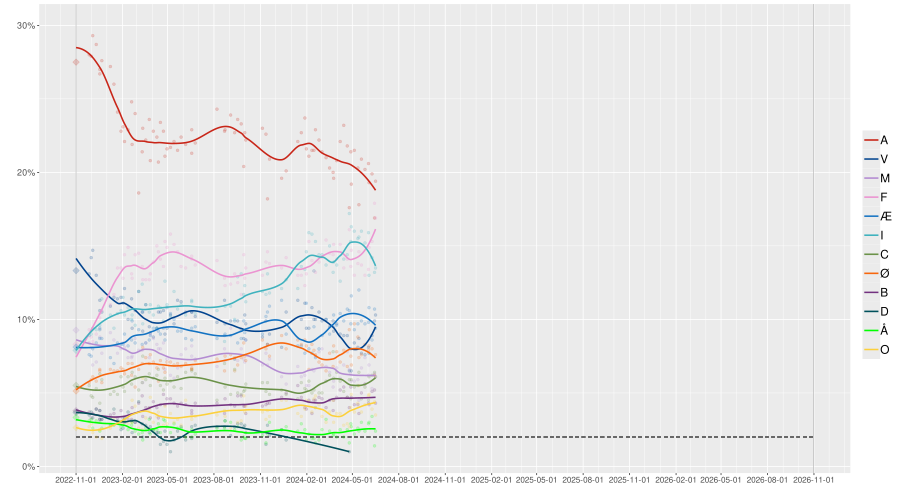Next Danish general election
Appearance
| |||||||||||||||||||||||||||||||||||||||||||||||||||||||||||||||||||||||||||||||||||||||||||
All 179 seats in the Folketing 175 from Denmark, 2 from Greenland and 2 from the Faroe Islands 90 seats needed for a majority | |||||||||||||||||||||||||||||||||||||||||||||||||||||||||||||||||||||||||||||||||||||||||||
| |||||||||||||||||||||||||||||||||||||||||||||||||||||||||||||||||||||||||||||||||||||||||||
General elections are scheduled to be held in Denmark no later than 31 October 2026, according to § 32 in the constitution, which defines an election cycle as four years. All 179 seats in the Folketing will be up for election, 175 in Denmark proper, two in Greenland and two in the Faroe Islands (the two other territories of the Danish Realm).[2]
Background
[edit]The previous general elections were held on 31 October 2022 in the Faroe Islands and on 1 November in Denmark and Greenland. The elections led to a narrow victory for the red bloc.[3] Following the election, a centrist government led by Prime Minister Mette Frederiksen and consisting of the Social Democrats (A), Venstre (V) and the Moderates (M) was established.[4]
Opinion polls
[edit]
Notes
[edit]- ^ Formally, the Red–Green Alliance have collective leadership[1]
References
[edit]- ^ Hoffmann-Hansen, Henrik; Fabricius, Kitte (10 May 2019). "Overblik: Partierne i Danmark". Kristeligt Dagblad (in Danish). Retrieved 20 May 2019.
- ^ "Elections in Denmark". The Danish Parliament. Retrieved 8 November 2022.
- ^ "Denmark election: Centre-left bloc comes out on top". BBC News. 2 November 2022. Retrieved 8 November 2022.
- ^ Bohr, Jakob Kjøgx (15 December 2022). "Her er SVM-regeringens ministre - TV 2". nyheder.tv2.dk (in Danish). Retrieved 15 December 2022.
